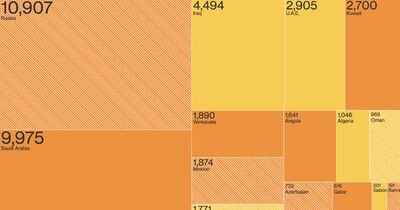
Photographer: Fayez Nureldine/AFP via Getty Images
https://www.bloomberg.com/news/articles/2017-10-26/saudi-crown-prince-backs-extending-opec-output-cuts-into-2018-j987r4ea
-
Prince Mohammed bin Salman says ‘of course’ supports roll-over
-
Heir to throne says Saudi Aramco IPO is ‘on track’ for 2018
Saudi Arabian Crown Prince Mohammed bin Salman backed the extension
of OPEC production cuts beyond March 2018, making it all but certain the
cartel and its allies will roll over the curbs at a meeting next month.
The
prince, who’s become the kingdom’s dominant political force, said in an
interview with Bloomberg News that "of course" he wanted to extend the
cuts into 2018. "We need to continue stabilizing the market," he said.
Until
now, Saudi officials have signaled they favored prolonging the cuts,
but stopped short of making a formal commitment, saying all options were
still open. Oil erased losses on Prince Mohammed’s comments, with West
Texas Intermediate crude little changed at $52.17 a barrel at 10:26 a.m.
in London after having earlier dropped as much as 0.4 percent.
His comments, weeks after Russian President Vladimir Putin
also gave provisional backing to an extension, signal that Riyadh and
Moscow are ready to prolong their collaboration to reduce oil supply and
lift energy prices. If confirmed at OPEC’s meeting next month, the
extension may boost oil prices, improving the fortunes of the global
energy industry and oil-dependent countries from Nigeria to Brazil.

For
Prince Mohammed, who replaced his cousin earlier this year as heir to
the throne, higher prices will help revive economic growth in Saudi
Arabia and eventually feed through to the initial public offering of the
country’s state-owned oil giant, Saudi Aramco.
IPO Plans
The
32-year-old royal said Aramco will IPO in 2018, most likely in the
second half. "We are on the right track," he said, repeating the same
formula Saudi officials have been using for weeks to counter talk of a
potential delay.
"We don’t have any problems, we have a lot of work and a lot
of decisions and there are a lot of things that will be announced," he
added. The Aramco IPO is the cornerstone of Vision 2030, a much wider
plan conceived to reshape the Saudi economy and diminish its dependence
on oil.
Tadawul, Saudi Arabia’s stock exchange, hopes to be the sole venue
for the Aramco listing, Chief Executive Officer Khalid Al Hussan said
at a conference in Riyadh on Thursday. The company is still considering
locations for the listing, with London and New York vying for a major
role alongside Hong Kong, Singapore, Tokyo and Toronto.
Prince Mohammed said that extending the cuts would bring benefits for both OPEC and non-OPEC producers.
"Everyone
is benefiting," he said. "It’s the first time we have an OPEC and
non-OPEC deal in stabilizing the oil market," he added, speaking as the
country welcomed a who’s who of global finance in a meeting in Riyadh
many participants dubbed "Davos in the Desert."
Putin said earlier
this month in Moscow that if OPEC and its allies decided to extend the
cuts, they should do it until the end of next year. OPEC
Secretary-General Mohammad Barkindo said last week that statement is the
basis for talks ahead of next month’s meeting, led by Russian Energy
Minister Alexander Novak and his Saudi counterpart Khalid Al-Falih.
"Every day, everyone is starting to believe it
more," Prince Mohammed said in Riyadh, declining to give a timeline of
the extension. "They have seen the results. So everyone has the interest
to continue keeping the agreement.”
OPEC and a coalition of
non-OPEC nations, led by Russia, agreed a year ago to reduce production
by 1.8 million barrels a day -- roughly equal to the consumption of
France. The deal, personally negotiated by Prince Mohammed and President
Putin, was the first Saudi-Russia collaboration in oil in a decade,
marking a turn in the frosty relationship between the two nations.
The
24 oil-producing nations that participated in the cuts initially
intended to reduce output for six months starting in January, but the
supply glut that has weighed on prices since late 2014 has ebbed more
slowly than expected. As a result, the group agreed to roll over the
cuts in June for another nine months, until the end of March 2018.
While
oil prices have risen, with international benchmark Brent near $60 a
barrel as the physical market has improved, traders and analysts are
still painting a cautious outlook for next year due to forecasts for
rising output from the U.S., Brazil and Kazakhstan.
Yet, Prince Mohammed gave a rosier view of the oil market, suggesting he believes higher prices are coming.
"The
market has already swallowed the new supply of the shale oil,” he said.
"It’s swallowed. Now it’s part of supply. Now we are going into a new
era.”
— With assistance by Riad Hamade, Erik Schatzker, Wael Mahdi, Glen Carey, and Matthew Martin

No comments:
Post a Comment